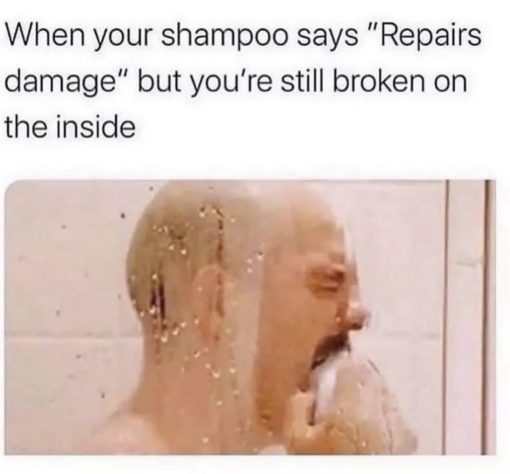When your shampoo says Repairs damage but you re still broken on the inside
The image presented appears to be a meme with two distinct components. The upper part consists of a text that reads "When your shampoo says 'Repairs damage' but you’re still broken on the inside". Below this caption is a photograph of a person visibly in distress. This person's face is scrunched up, eyes closed, with water and possibly shampoo running down their face. The visual discomfort and the suggestion of emotional turmoil evoke a sense of over-dramatic despair typically not associated with the simple act of shampooing.
The humor in this image arises primarily from the juxtaposition of a literal interpretation of an advertising claim with a metaphorical understanding of personal wellbeing. Shampoo advertisements often tout their products as capable of 'repairing damage' to one's hair, a physical attribute. The text humorously applies this claim to the concept of emotional or psychological damage, something no shampoo could possibly address.
Moreover, the expression of the person in the shower - one of anguish or exaggerated lament - is presented in a context that normally wouldn't warrant such an extreme emotional response. Taking a shower and washing one's hair is a mundane, everyday task, yet the person appears to be in the throes of a profound personal crisis. The contrast between the ordinary setting and the dramatic reaction creates a visual hyperbole, enhancing the comedic effect.
Additionally, the meme taps into a relatable feeling of disappointment when products fail to live up to their marketing promises, though it does so in an absurdly exaggerated manner. People often buy products with the hope that they will somehow improve their lives, and the contrast between the optimistic language of advertising and the complex reality of human emotions is a source of wry recognition and humor.
The meme also pokes fun at the self-awareness of personal issues, suggesting that while one can tend to external trappings, internal strife is not as easily resolved. By connecting the two, the image implicitly comments on the sometimes superficial nature of consumerism that implies superficial changes can have deep impacts.
Lastly, the humor works through the ubiquitous nature of internet memes as vehicles for expressing and sharing emotions in a lighthearted way. This image encapsulates a common sentiment – that products, or external fixes, are inadequate for deep personal issues – and packages this notion in a comical format that people can relate to and share as a way to communicate their feelings, or simply to garner a laugh from the absurdity of the comparison. When your shampoo says Repairs damage but you re still broken on the inside
